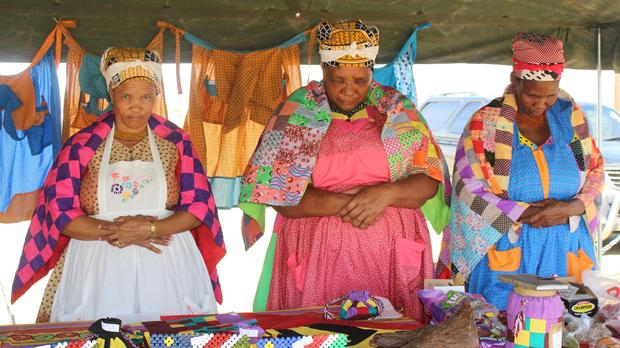It would be nothing short of racist for Germany to deny the Herero and Nama people financial reparations, writes Shannon Ebrahim.
Any time now we can expect Chancellor Angela Merkel to issue a formal apology to Namibia for the genocide exacted on the Herero and Nama people by German colonial authorities from November 1904.
It was the first genocide of the 20th century, and it is only recently that the official line of the German government has been that “the war of annihilation in Namibia between 1904 and 1908 was a war crime and genocide”.
While an apology will be more than a century too late, it will nevertheless be welcomed, but it is not enough.

Nama women attend the Africa Day celebration in Tses, southern Namibia. With the remaining Herero and Nama populations living in a sea of poverty, it is hard to stomach the fact that absentee German landlords control massive expanses of land which were stolen to begin with, says the writer. File picture: Xinhua/Nampa
If Germany paid billions of dollars to survivors of the Jewish holocaust, then there is an existing precedent for reparations, and it would be nothing short of racist to deny the Herero and Nama people financial reparations. The significant expanses of land which the Germans took from the Herero and Nama people during the genocide was good farmland as most of it is in grazing country.
Even if enough time has passed that the 16000 survivors of the genocide are no longer alive, reparations could be made to the community, empowering them to buy some of their land back. The communities live in poverty, and cattle and land are historically important to them.
But the official response has been that the German government will not entertain the idea of reparations. Perhaps this is due to the fact that Germany fears reparations will open a pandora’s box which may lead to their nationals in Namibia being forced to sell their massive farms (many as large as 30000 hectares) at market-related prices, or it is mere stinginess.
The German government defends its position by emphasising the amount of development aid that it has given to the Namibian government over the past decade.
But it is hard to point to how this aid has benefited the Herero and Nama people. The communities are resentful of the huge properties of the German farmers, whose ancestors arrived after the genocide from 1908 to 1913 to carve up the 46 million hectares of expropriated land.
It is widely recognised that 80% of Namibia’s farmland is owned by Germans, and many of the landowners do not live in the country but visit once a year, often to go hunting. With the remaining Herero and Nama populations living in a sea of poverty, it is hard to stomach the fact that absentee German landlords control massive expanses of land which were stolen to begin with.
Maybe the German government should consider the fact that if they do not extend some significant financial largesse alongside the olive branch it plans to extend to the Herero and Nama people, their nationals may find themselves on the receiving end of Zimbabwean-style land invasions.
The historical memory of the Herero and Nama people is not something that will fade soon. Each year the older generations stand beside the youth on August 26 to commemorate Red Flag Day and their ancestors who died at the hands of the German colonial invaders. They remember and re-enact the scenes of naked bodies hung by the neck from trees – the revenge of the Germans to the rebellion of the Herero and Nama people against colonial subjugation.
Even though the 1904 uprising was put down almost immediately, on November 4 General Lothar von Trotha read out his extermination order saying: “Within the German borders every Herero, with or without a gun, with or without cattle, will be shot the nation as such should be annihilated.”
Von Trotha boasted that they would finish all the Herero by 9am. The people were pushed into the desert and then gathered into concentration camps where they were starved and abused. Many died from poison which was put into waterholes and dams. Within a few years half the Nama and 80% of the Herero had been killed. More than 100000 people lost their lives.
Bizarre racial experiments, like those of the Nazi concentration camps, were performed on Herero and Nama prisoners. Thousands of their skulls were sent to Germany for experiments in race research institutes.
New research suggests that the German racial genocide in Namibia was a significant influence on the Nazis in World War II. Many of the key elements of Nazi ideology such as racial science and eugenics were promoted by German military veterans and scientists who had begun their careers in South-West Africa, now Namibia, during the genocide.
If Germany is to finally make peace with the sins of its past and enable the communities it decimated to recover and move on to a more profitable future, it does have an obligation to put its money where its mouth is.
An apology is imperative, but so are reparations and redistributive justice.
* Shannon Ebrahim is Independent Media’s Foreign Editor.
The Sunday Independent














